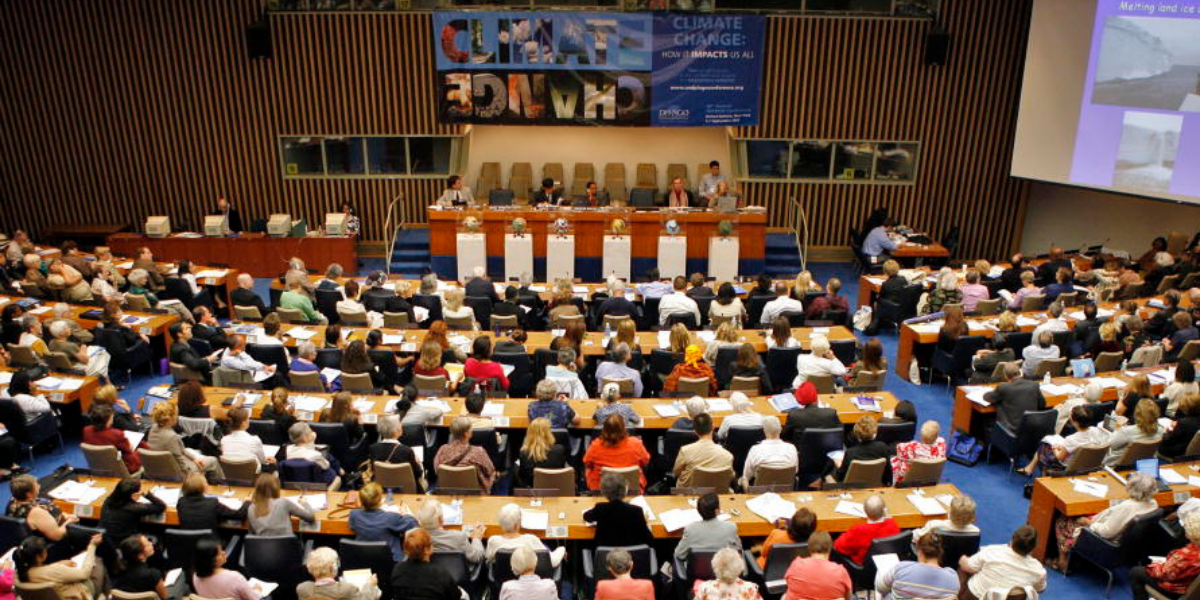Photo: United Nations Photo.
The Laudato Si week, commemorated every year in honor of Pope Francis’ encyclical on integral ecology, shares a vision of a more sustainable and fair world. Within this framework, CIDSE, the Dicastery for promoting integral human development, the Global Catholic Climate Movement and CAFOD organised the webinar: “Critical Opportunities in 2021 to create change: calls for an integral path”, with the objective of highlighting the important political opportunities in 2021 to create change.
Through the testimony of the three panelists, participants were able to hear first-hand the demands of those who experience the effects of the climate crisis and the threat to biodiversity.
Ditebogo Lebea, climate activist and Youth Programmes Associate, South African Institute of International Affairs
Africa is one of the regions that live the dramatic impacts of the climate crisis. Increasing temperatures and sea levels, changing precipitation patterns and more extreme weather are some of its symptoms, taking a heavy toll on people. Such weather phenomena are, according to the United Nations, directly threatening human health and safety, food and water security and socio-economic development.
Ditebogo is part of the young generation that has experienced the climate crisis, as with her family she has endured flash flooding and droughts. “As a young person, I believe that climate justice is social justice. Climate justice is intersectional; social issues such as unemployment, inequality, access to electricity, crime, gender-based violence, and so many more still plague our society”, she said during her presentation.
These inequalities in societies like the one in which Ditebogo lives got worst once the COVID-19 pandemic hit: “The global pandemic has opened our eyes to social injustice and to the adverse effects of climate change on vulnerable communities. It has presented the perfect opportunity for us to also correct, to change the system in place and to allow us to adequately address the climate crisis in a way that ensures no country is left behind and everyone finds their way in this course”. Are we doing enough to save the planet? Ditebogo challenged participants and all stakeholders globally. Everyone needs to do her/his part and there is no time to watse.
Fr. Augusto Zampini, Adjunct Secretary, Dicastery for Promoting Integral Human Development/Vatican
During ten days, the Vatican with several partners celebrated the progress Catholics have made in bringing Laudato Si’ to life and inspire the faithful ahead of the UN Biodiversity Conference (COP15), the 26th UN Climate Change Conference (COP26) and the decade ahead. This webinar was also an opportunity to highlight how Laudato Si’ inspired catholic messages around these processes pointing out that the climate crisis and spiraling biodiversity loss are one and the same human induced crisis. With this online panel, organisers aimed to provide a platform for representatives of the global youth and indigenous communities to be heard and to guide our listening to “the cry of the earth and the cry of the poor” as one cry.
Augusto Zampini pointed out the need to return to our roots in order to promote the change we want to see in our planet: “We have to see what are the mentality of the root and roots that we have in all these crises. First of all, the extractivist mentality, that we extract from the earth, we extract from people, we extract from others, without being related to them and that is creating a massive problem, not only environmentally speaking, but socially speaking”.
He finally reflected on the first steps we need to take to accomplish this: “First we need to love, and therefore if we love, we listen to the cry of those beloved”.
José Gregorio Díaz Mirabal, Coordinator, Congress of Indigenous Organisations of the Amazon Basin (COICA)
One of the messages of the webinar is that in climate and biodiversity agreements and actions at global, national and local levels, the rights of Indigenous people and local communities must be respected, protected and promoted, though their active participation in decision-making, especially when it is related to the security of lands. José Gregorio highlighted the importance of ancestral knowledge and the crucial role that indigenous communities play in the protection of biodiversity around the world. “We have great solutions but they are not heard. 80% of the biodiversity and 30% of the best conserved territories are in indigenous territories, but what is the response of governments and companies? Deforestation, pesticides, excessive livestock, and this goes against our vision of conservation . There are still 400 billion trees alive in the Amazon Basin and we are 3 million indigenous peoples who are alive despite the pandemic, murder and violence in the Amazon”.
Ahead of COP 26, civil society is calling for an urgently increasing near-term ambition and action in NDCs in order to get on track for limiting global warming to 1.5 degrees Celsius. Meanwhile, at the Convention for Biological Diversity COP 15, we need to see the adoption of an ambitious and equitable new global agreement to ensure that there will be no more biodiversity loss, protecting what is intact, and restoring and sustainably managing all lands and waters.
“Our message from the Amazon basin is that it is not possible to live without the forest, without nature, without trees, without water. There is no life. It is incredible that world trade and transnational companies continue to burn and deforest the Amazon rainforest when the world economy depends on ecosystems, but we do not understand that. We want to make a call to all the religions of the world: let us unite to revive, fight and save the life of the planet”, reminded José Gregorio.

